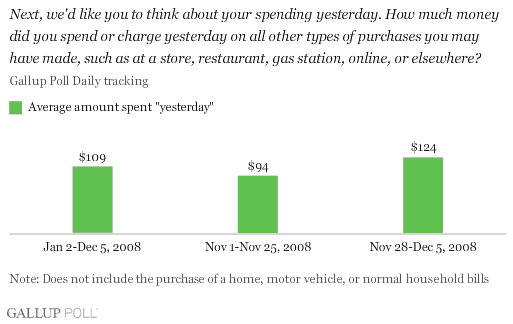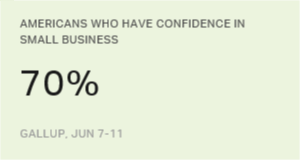PRINCETON, NJ -- American consumer spending has picked up since Thanksgiving Day, as would be expected given the holiday shopping period. Average consumer spending from Friday, Nov. 28 through Friday, Dec. 5 is well above the average for November prior to Thanksgiving, and also above the average spending for all of 2008 so far.

Gallup's daily spending measure asks Americans each day to report on how much money they spent "yesterday," excluding the purchase of a house, a motor vehicle, or normal household bills.
For the period from Nov. 1 through Nov. 25 (the Tuesday before Thanksgiving), average spending was $94. This total for the pre-Thanksgiving days of November was below the year-to-date average daily spending of $109, consistent with the general pullback in consumer spending Gallup has noted over the last several months.
Spending on Thanksgiving Day itself plunged to the lowest daily average of the year so far ($39), but on Black Friday, consumer spending zoomed to $177, among the top 10% of spending days so far this year.
Since Black Friday, daily spending has dropped back some, but has generally remained above both the yearly average as measured by Gallup, and the average for November through Thanksgiving.
Average daily spending for the period encompassing Friday, Nov. 28 through Friday, Dec. 5 is $124, a significant increase over the pre-Black Friday period in November. Average post-Thanksgiving spending is also above the year-to-date average for 2008 ($109), indicating not only an uptick from the very anemic pre-Thanksgiving spending patterns but also a lift from the year-to-date spending patterns.
Gallup began tracking consumer spending on Jan. 2 of this year, and therefore there are no comparable data from previous years against which to benchmark this year's daily spending in the crucial Christmas shopping period. Therefore, it is difficult to judge whether the increase in post-Thanksgiving spending is above, below, or about where it would be in a typical year.
( It should also be noted that the "how much did you spend yesterday" measure is not specific just to holiday shopping but encompasses spending for all reasons. It is a reasonable assumption, however, that changes in overall spending reflect at least in part added shopping relating to Christmas.)
Separately, Gallup's traditional direct measure of Christmas spending has shown that on a comparative basis, Americans report lower average anticipated spending on gifts this year than in any previous year in which this measure has been updated, and that a higher percentage of Americans have reported that they are spending less than usual. These measures were updated this past weekend, and Gallup will provide a report on what they show on Tuesday of this week.
Survey Methods
For the Gallup Poll Daily tracking survey, Gallup is interviewing no fewer than 1,000 U.S. adults nationwide each day during 2008. The consumer spending questions reviewed in this article are based on interviews with a random half-sample of approximately 500 adults each night. For results based on each night's sample, the maximum margin of sampling error is ±$43.
For results based on the sample of approximately 7,000 adults in the 14-day rolling average, the maximum margin of sampling error is ±$13.
Interviews are conducted with respondents on land-line telephones (for respondents with a land-line telephone) and cellular phones (for respondents who are cell-phone only).
In addition to sampling error, question wording and practical difficulties in conducting surveys can introduce error or bias into the findings of public opinion polls.
